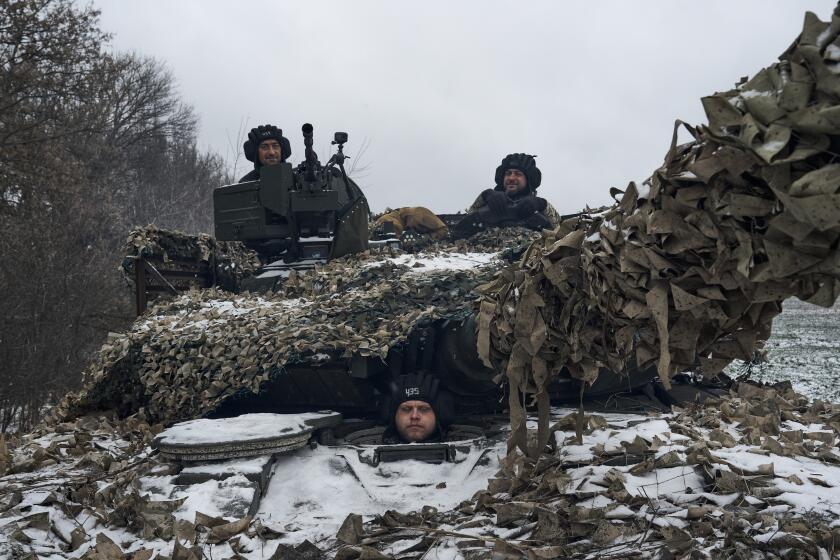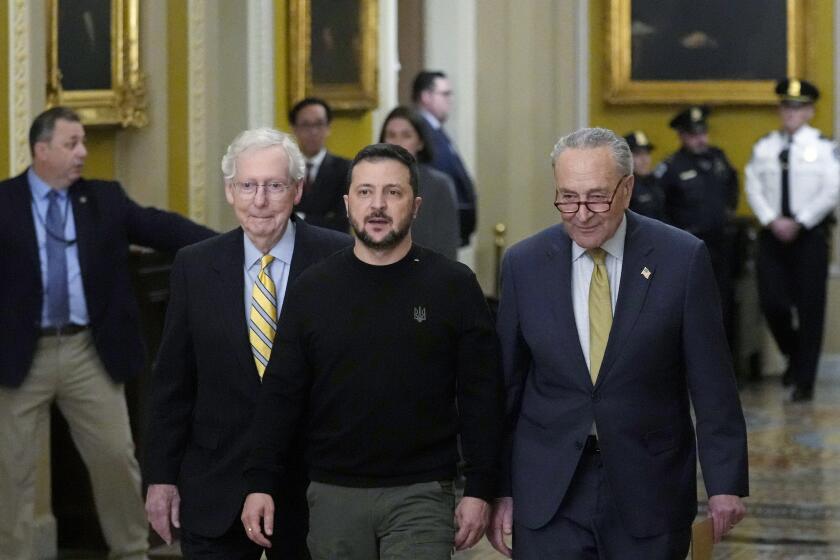Opinion: Amid the Ukraine war, are sanctions against Russia working?

- Share via
In February 2022, Russian troops mounted an invasion of Ukraine. Following Russia’s flagrant violation of Ukrainian territorial sovereignty, the U.S. joined with nations around the world to impose sanctions. Instead of military action against Russia, these countries turned to economic warfare.
The world now approaches two years of Russia’s war, and Ukrainian president Volodymyr Zelensky came to Washington, D.C., this week to lobby Congress for support after Republican lawmakers rejected President Biden’s proposed aid package to Ukraine. In this moment, the U.S. and other sanctioning nations face additional pivotal questions: Have sanctions and international trade measures made a difference? Should they be continued?
Republicans are holding aid to fight Russia hostage to their unreasonable demand for concessions from the Biden administration on immigration policy.
The first few rounds of economic sanctions — which are still in effect or else have been strengthened — isolated major Russian banks by limiting their ability to transact in the pound, euro and dollar and, in some instances, freezing their assets held in the sanctioning jurisdictions. Also frozen were the assets of many oligarchs, including some who funded Vladimir Putin and his war machine. Export controls limited the Russian military’s access to goods from sanctioning nations and attempted to reduce the shipment into Russia of certain goods such as semiconductors, which could be used in military equipment. Imports of select Russian-origin products were also banned from sanctioning jurisdictions.
Notably, the Group of 7 — which meets annually on economic policy and consists of the U.S., Canada, France, Germany, Italy, Japan and the U.K. — along with Australia and the European Union, agreed to ban most imports of Russian-origin crude oil. They also imposed a price cap under which nationals of G-7 countries could provide services connected to the shipment of Russian-origin oil to countries such as China and India, so long as the oil was priced at or below $60 per barrel. The goal of the price cap was to ensure the continued flow of oil supplies around the world while limiting the amount of revenue Russia amassed from their sale.
Certainly, the sanctions have not caused Putin to pull troops back from Ukraine. But there could have been no reasonable expectation for such a result. Past sanctions and embargoes have generally been unable to trigger regime changes — think Fidel Castro in Cuba, Saddam Hussein in Iraq or Kim Jong Un in North Korea. The sweeping economic restrictions of the World War II era were insufficient to defeat Germany or Japan on their own, without military action.
The biggest worry for Ukrainians is what’s happening in Washington: Will the U.S. continue to help, and with what level of support?
The sanctions against Russia were merely some of the best tools available — perhaps second only to military aid to Ukraine — to respond to Russia’s violations of international law without direct military intervention. And to date, the sanctions have had a significant impact.
The blocking of Russian assets held in sanctioning countries, including assets of the Russian Central Bank, diminished the resources available to Russia for its war effort. In October, data provided by the European Council indicated that the Russian economy shrank in 2022, as did the volume of the country’s exports. Russia now faces significant inflation. In the long term, sanctions, paired with Russia’s ongoing diversion of resources into the war effect, may sap Russian economic growth and development.
But as of today, the data on how the sanctions have affected war production is mixed. Although Russia’s diversion of resources to military production and conscription has triggered labor shortages in other sectors, its production of missiles and tanks has climbed higher than prewar levels. Russia has found ways to overcome the oil price cap to keep revenue flowing, such as by using non-G-7 insurance providers and building up its own fleet. Ships from other countries also violate the price cap through tactics that include disguising, or “spoofing,” their maritime locations and moving oil via ship-to-ship transfers to conceal its Russian origins.
Ukraine came under attack from the air and from cyberspace as projectiles rained down on a southern region and hackers knocked out cellphone service.
The sanctioning powers should, of course, be mindful that economic sanctions can trigger a heavy cost on civilians, both in the nations they target and in third-party countries. For example, Russia’s invasion of Ukraine and the sanctions were followed by global food and fertilizer shortages. To minimize that problem, the sanctioning nations have publicized existing carveouts for trade in these items and created further exemptions.
These nations could also impose measures that are less likely to trigger humanitarian consequences but can make sanctions more effective. More stringent enforcement of export controls on semiconductors, lasers and other higher-tech items would help deny resources to the Russian military, as would stricter enforcement of the price cap on oil. The U.S. recently announced additional sanctions on parties who violate or evade the price cap, strengthening that approach. Another way to enforce the cap would be secondary sanctions on entities from non-sanctioning nations, based on those entities’ support of Russian companies that are already subject to sanctions.
Despite their limitations, the sanctions and international trade measures imposed against Russia have been important multilateral responses to the illegal war in Ukraine. Russia is now adapting to their presence, but that is not reason to pull back on these strategies. Instead, the coalition of sanctioning powers should refine and reinforce these efforts as a crucial source of support for Ukraine.
Christine Abely is an assistant professor of law at New England Law Boston and the author of “The Russia Sanctions: The Economic Response to Russia’s Invasion of Ukraine,” which publishes this month.
More to Read
A cure for the common opinion
Get thought-provoking perspectives with our weekly newsletter.
You may occasionally receive promotional content from the Los Angeles Times.













